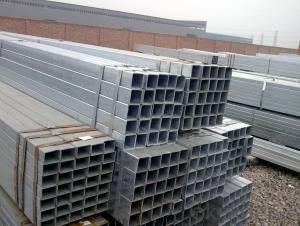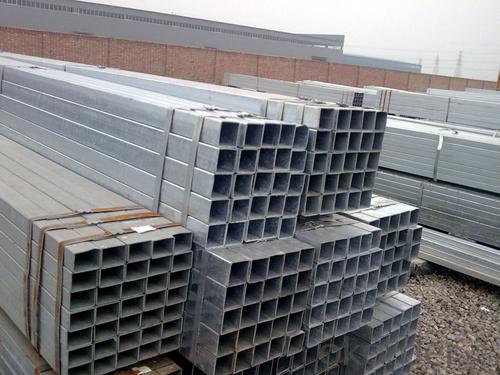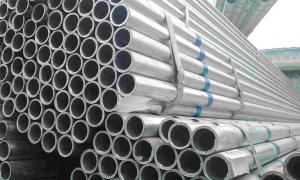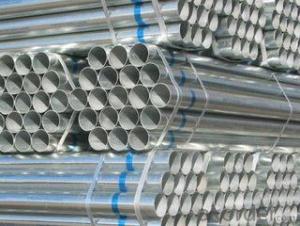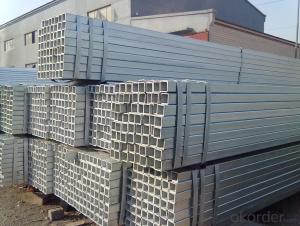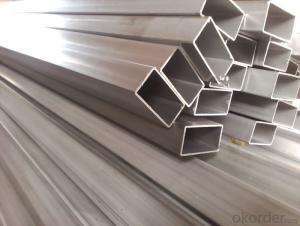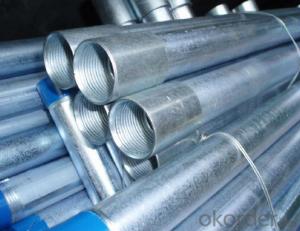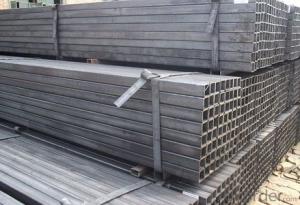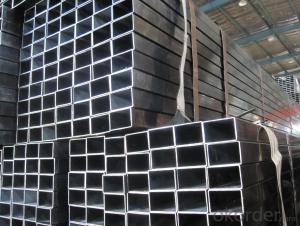Galvanized pipe/galvanized hollow section
- Loading Port:
- Tianjin
- Payment Terms:
- TT or LC
- Min Order Qty:
- 10 m.t.
- Supply Capability:
- 5000 m.t./month
OKorder Service Pledge
OKorder Financial Service
You Might Also Like
1、Structure of Galvanized hollow section DIN-A21:
Galvanized hollow section DIN-A21 is formed by drawing a solid billet over a piercing rod to create the hollow shell. As the manufacturing process does not include any welding, seamless pipes are perceived to be stronger and more reliable. we can provide you best service as we can, and we sure that we can give you satisfy sprice.
2、Main Features of the Galvanized hollow section DIN-A21: :
• High manufacturing accuracy
• High strength
• Small inertia resistance
• Strong heat dissipation ability
• Good visual effect
• Reasonable price
3、Galvanized hollow section DIN-A21 Specification:
Standard | GB, DIN, ASTM ASTM A106-2006, ASTM A53-2007 |
Grade | 10#-45#, 16Mn 10#, 20#, 45#, 16Mn |
Thickness | 8 - 33 mm |
Section Shape | Round |
Outer Diameter | 133 - 219 mm |
Place of Origin | Shandong, China (Mainland) |
Secondary Or Not | Non-secondary |
Application | Hydraulic Pipe |
Technique | Cold Drawn |
Certification | API |
Surface Treatment | factory state or painted black |
Special Pipe | API Pipe |
Alloy Or Not | Non-alloy |
Length | 5-12M |
Outer Diameter | 21.3-610mm |
Grade | 20#, 45#, Q345, API J55, API K55, API L80, API N80, API P110, A53B |
Standard | ASME, ASTM |
1) Material:20#(ASTM A 106/A53 GRB.API5LGRB,GB),45#,16Mn,10#.
2) Specification range:OD:21.3-610mm,WT:6-70mm,length:6-12m or according to the requirement of clients.
3) Excutive standards:GB,ASME API5L.ASTM A 106/A53,Despite of the above standards,we can also supply seamless steel pipe with standard of DIN,JIS,and so on,and also develop new products according to the requirements of our clients!
4) Surface:black lacquered,varnish coating or galvanized.
5) Ends:Beveled or square cut,plastic capped,painted.
6) Packing:bundles wrapped with strong steel strip,seaworthy packing.
4、Packaging & Delivery
Packaging Details: | seaworthy package,bundles wrapped with strong steel strip |
Delivery Detail: | 15-30days after received 30%TT |
5、FAQ of Galvanized hollow section DIN-A21:
①How is the quality of your products?
Our products are manufactured strictly according to national and internaional standard, and we take a test
on every pipe before delivered out. If you want see our quality certifications and all kinds of testing report, please just ask us for it.
Guaranteed: If products’ quality don’t accord to discription as we give or the promise before you place order, we promise 100% refund.
②How about price?
Yes, we are factory and be able to give you lowest price below market one, and we have a policy that “ for saving time and absolutely honest business attitude, we quote as lowest as possible for any customer, and discount can be given according to quantity”,if you like bargain and factory price is not low enough as you think, just don’t waste your time.Please trust the quotation we would give you, it is professional one.
③Why should you chose us?
Chose happens because of quality, then price, We can give you both.Additionally, we can also offer professional products inquiry, products knowledge train(for agents), smooth goods delivery, exellent customer solution proposals.Our service formula: good quality+good price+good service=customer’s trust
SGS test is available, customer inspection before shipping is welcome, third party inspection is no problem.
6、Galvanized hollow section DIN-A21 Images:
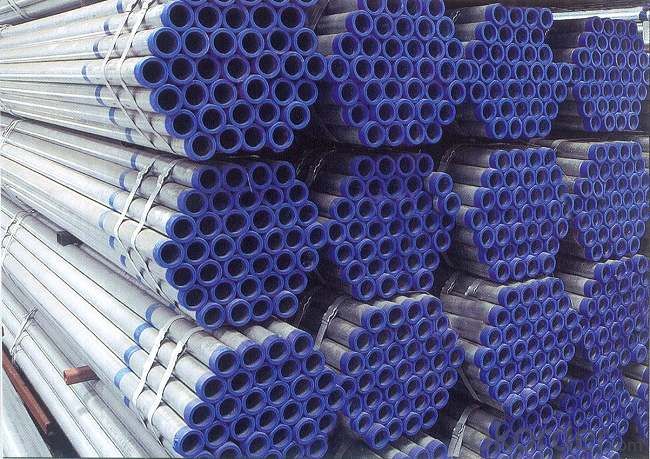
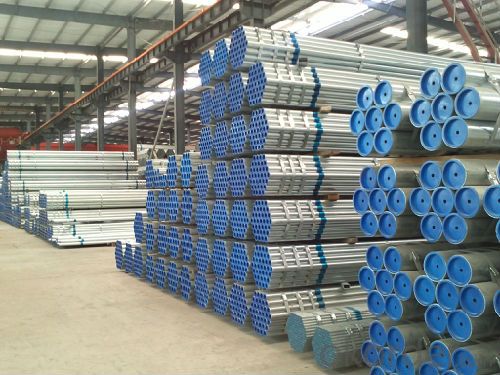
- Q: Can steel pipes be used for conveying sewage and wastewater?
- Yes, steel pipes can be used for conveying sewage and wastewater. Steel pipes are known for their strength, durability, and resistance to corrosion, making them suitable for transporting various types of fluids, including sewage and wastewater. Additionally, steel pipes can withstand high pressure and are capable of handling the abrasive and corrosive nature of sewage and wastewater, making them a reliable choice for such applications.
- Q: What is the role of steel pipes in power plants?
- Steel pipes play a crucial role in power plants as they are used for transporting various fluids, such as water, steam, and fuel, throughout the facility. These pipes are designed to withstand high temperatures, pressure, and corrosive environments, ensuring a safe and efficient operation of power generation equipment. They facilitate the circulation of cooling water, carry steam to drive turbines, and transport fuel to boilers, helping to generate electricity in power plants.
- Q: What are the different types of pipe connections used with steel pipes?
- There are several types of pipe connections used with steel pipes, including threaded connections, welded connections, flanged connections, and grooved connections.
- Q: How are steel pipes used in the telecommunications infrastructure?
- Steel pipes are used in the telecommunications infrastructure for various purposes such as underground cable installation, mounting antennas, and supporting communication towers. They provide durability, strength, and protection for the cables and equipment, ensuring reliable and efficient communication networks.
- Q: How are steel pipes used in the construction of nuclear power plants?
- Steel pipes are used in the construction of nuclear power plants for various purposes, such as transporting and containing fluids and gases, including coolant, steam, and compressed air. They are specifically chosen for their high strength, durability, and resistance to heat and pressure. Steel pipes are used in the construction of primary and secondary cooling systems, reactor vessels, and other critical components, ensuring the safe and efficient operation of nuclear power plants.
- Q: How are steel pipes protected from corrosion in corrosive environments?
- Steel pipes are protected from corrosion in corrosive environments through various methods such as coating the pipes with corrosion-resistant materials like epoxy or zinc, using cathodic protection techniques, and implementing regular inspections and maintenance to identify and address any potential corrosion issues.
- Q: How are steel pipes repaired if they are damaged?
- Steel pipes can be repaired if they are damaged through various methods such as welding, patching, or using pipe clamps.
- Q: What are the different types of steel pipe valves?
- Various industries and applications commonly utilize several types of steel pipe valves. Here, we present some of the most frequently used types: 1. Gate valves: These valves control fluid flow by raising or lowering a gate or wedge that obstructs the flow path. They ensure a tight seal when closed and are prevalent in applications requiring complete shut-off or full flow. 2. Globe valves: With a globe-shaped body and a movable plug or disc, these valves regulate fluid flow. They excel in throttling capabilities and find application in situations demanding precise flow control. 3. Ball valves: Fluid flow is managed by a rotating ball with a hole in these valves. Alignment of the hole with the pipe signifies full openness, while a perpendicular hole indicates closure. Ball valves are durable, reliable, and extensively used in swift and effortless shut-off applications. 4. Check valves: These valves allow fluid flow in only one direction, preventing backflow. They are instrumental in safeguarding pumps, compressors, and other equipment from reverse flow-induced damage. 5. Butterfly valves: Butterfly valves feature a rotating disc within the pipe to control fluid flow. They are lightweight, compact, and provide rapid shut-off. Butterfly valves are commonly employed in large-scale applications like water treatment and HVAC systems. 6. Plug valves: By utilizing a cylindrical or conical plug, plug valves regulate flow within the valve body. Their simple design, ease of operation, and dependable shut-off capabilities make them prevalent in applications requiring frequent operation and high pressure ratings. 7. Diaphragm valves: These valves employ a flexible diaphragm to manage fluid flow. Pressing the diaphragm against the valve seat blocks flow, while lifting it allows flow. Diaphragm valves are frequently used in environments requiring sterility or hygiene. These examples illustrate the variety of steel pipe valves available in the market. The choice of valve depends on specific requirements, including flow rate, pressure, temperature, and the nature of the transported fluid.
- Q: Can steel pipes be painted?
- Yes, steel pipes can be painted. The process typically involves cleaning and preparing the surface, applying a primer, and then using a suitable paint or coating to achieve the desired finish.
- Q: What are the advantages of using steel pipes in the manufacturing of furniture?
- There are several advantages of using steel pipes in the manufacturing of furniture. Firstly, steel pipes offer exceptional strength and durability, ensuring that the furniture will be long-lasting and capable of withstanding heavy use. Secondly, steel pipes are highly resistant to corrosion, making them suitable for both indoor and outdoor furniture. Additionally, steel pipes provide a sleek and modern aesthetic, adding a touch of sophistication to the furniture design. Lastly, steel pipes are relatively lightweight compared to other materials like wood or concrete, making transportation and installation easier. Overall, using steel pipes in furniture manufacturing offers a combination of strength, durability, aesthetic appeal, and practicality.
Send your message to us
Galvanized pipe/galvanized hollow section
- Loading Port:
- Tianjin
- Payment Terms:
- TT or LC
- Min Order Qty:
- 10 m.t.
- Supply Capability:
- 5000 m.t./month
OKorder Service Pledge
OKorder Financial Service
Similar products
Hot products
Hot Searches
Related keywords
